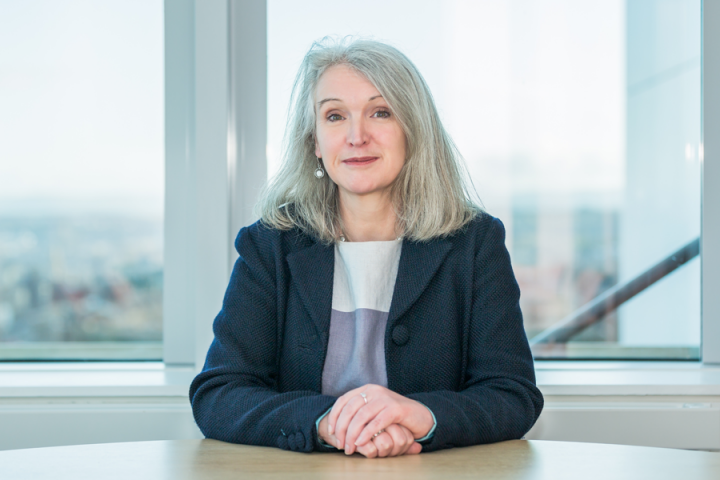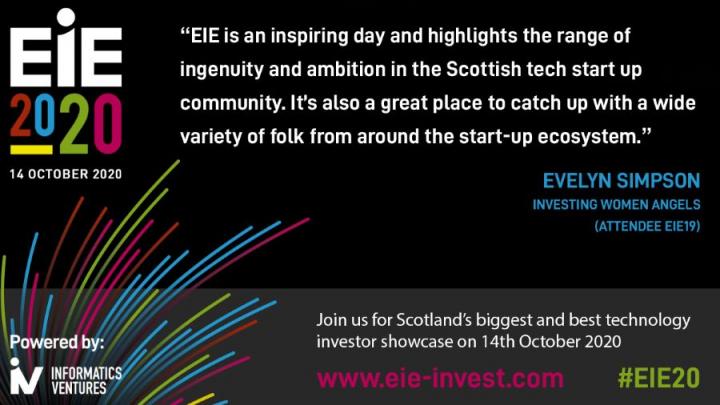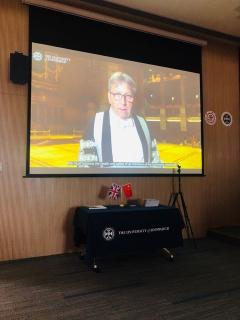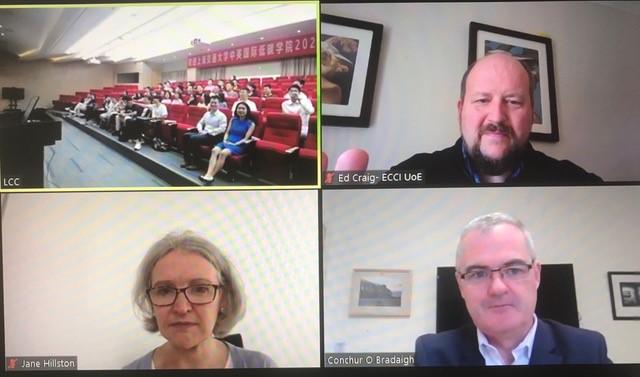Informatics Newsletter September 2020
Issue 39 of our School newsletter for students and staff.
A Message from Head of School

Dear colleagues,
I’d like to welcome everyone to the new academic year that started in earnest in September. Whether you are an established member of staff or a new one, a continuing student or someone who is just starting your degree, the start of the academic year represents a fresh start for all of us. It is always the case that this fresh start brings a mix of opportunities and challenges, but it might seem that this year the challenges outweigh the opportunities. Indeed, the Covid pandemic is forcing us to work differently and question many of the ways that we have lived and worked previously. Although we would not have chosen many of the changes that have been thrust upon us, they do present an opportunity to consider what is really important.
As a School in the University we know what is important to us: research and learning. We aim to push the boundaries of knowledge and to establish a community of learners, comprised of both staff and students, who seek to learn and fulfil their potential. These things remain constant regardless of where and how we undertake our activities. Nevertheless there are significant challenges in the year ahead, and the ever evolving situation will require us all to be flexible as we may need to adapt our ways of working in the coming months.
Meanwhile it is a glorious time of year, with clear bright air and the hint of frost in the mornings. Edinburgh has many pleasures to offer at this time, from walks in the Botanics and Arboretum to admire the changing colours of the trees to collecting conkers in Princes Street Gardens. Of course some of our community are in other countries at the moment and it would be good to hear what the pleasures of the seasons are where you are.
With best wishes,
Jane
New Staff
Research staff
Costy Kodsi started as a research associate at the Laboratory for Foundations of Computer Science on 1st September
Priya Gopalan started as a research fellow (Daphne Jackson Fellowship) at the Laboratory for Foundations of Computer Science on 2nd September
Highlights and Announcements
Roadmap to re-opening the School - latest updates
More colleagues who are essential for teaching delivery and associated activities have now returned to our buildings which are now open to authorised staff and students. Staff whose roles don't require their presence on campus are asked to continue to work from home. We are closely monitoring the Scottish Government guidance and will act upon it if it's required.
In the meantime, we have put together guidance about returning to your offices, as well as reporting Covid-19 cases. Scroll down for updates from Facilities for those of you who are in the building: we need you to observe the guidelines, as we are not out of the woods yet.
Please, also consider downloading the Protect Scotland App. More details below.
Returning to the campus - info and policies (secured)
Covid-19 reporting and recording process
Safety measures in Informatics buildings - information for students
Re-opening of the School of Informatics - latest updates
Virtual Doors Open Day 2020
Traditionally on the last weekend of September the School of Informatics would be participating in Doors Open Day, offering tours to Level 9 of the Appleton Tower and Roof Terrace of the Informatics Forum and risking infuriating some of our staff who'd hope for a quiet day in their office on a Sunday... this year we opened our doors virtually. Thanks to everyone who provided content and Mike Fourman who was happy to share his knowledge of all things relating to The Forum back in 2018.
School of Informatics at Doors Open Day 2020

EurAI Distinguished Service Award for Alan Bundy
Prof Alan Bundy has been awarded the 2020 EurAI Distinguished Service Award. EurAI is the European AI Society, which organises the ECAI conferences. The European Association for Artificial Intelligence EurAI (formerly ECCAI) was established in July 1982 as a representative body for the European Artificial Intelligence community. Its aim is to promote the study, research and application of Artificial Intelligence in Europe. The EurAI Distinguished Service Award is presented every two years to an individual who has made exceptional contributions to the AI community in Europe. Alan Bundy is Professor of Automated Reasoning here at the the School of Informatics. His research interests include: the automation of mathematical reasoning, with applications to reasoning about the correctness of computer software and hardware; and the automatic construction, analysis and evolution of representations of knowledge. His research combines artificial intelligence with theoretical computer science and applies this to practical problems in the development and maintenance of computing systems. He is the author of over 300 publications and has held over 60 research grants.
Informatics joins quantum leap in computing
A team of Edinburgh scientists lead by Prof Elham Kashefi are part of a national consortium that will build and operate Britain’s first commercial quantum computer - a revolutionary computer with huge processing power. The £10m collaboration, backed by a three-year grant award from UK Research and Innovation, will accelerate the development of cloud-accessible quantum computing, and is set to bring huge benefits to businesses, industry and research. Experts from the University’s School of Informatics will develop new ways for testing the hardware and verifying all aspects of quantum information processing. The team will also work with Standard Chartered to advance quantum machine learning applications for finance.
US company Rigetti Computing will lead the project. Other partners include high-tech tool maker Oxford Instruments, software start-up Phasecraft.
Find out more by reading our news story

Take part in EIE20 on 14th October 2020
Powered by Informatics Ventures, Engage Invest Exploit (EIE) is the international flagship event for Data Driven Innovation, attracting world class investors to the heart of the aspirational Data Driven capital of Europe. Home to Skyscanner and Fanduel, Edinburgh is now the UK’s largest hub for data-centric tech start-up and spin-out companies outside London, ahead of Oxford and Cambridge. EIE occupies a unique place in the Data Driven technology ecosystem in Scotland and its reputation for excellence spreads far beyond. Why not some along to the inaugural virtual event on 14 October 2020 to see the data-driven start-ups of the future? Register as a delegate now!
Register as a delegate at EIE20
Facilities update
With the start of term and more people returning to office-based work, we would like to remind people of what is expected in these new circumstances. The points that should be highlighted are:
- Signing in and out – please don’t forget to sign in and out of the buildings, even if you are just leaving for a short while or popping in for something.
- Coffee machines – there is a working coffee machine (and milk) in the Forum on Level 5
- Door access – please don’t let anyone in through a swipe access door, even if you know them – they might not have been through the induction yet and therefore shouldn’t be in the building.
InfHR Update
People and Money system implementation (important!)
Further to Joy’s email on 31st August regarding the recent and upcoming deadlines for recruiting staff InfHR would like to thank you for your patience during this busy period. InfHR are working through any requests to ensure they are processed by the deadline dates and would also like to remind you of the final upcoming deadlines:
Thursday 1st October - for all non-advertised (6 months of less appointment) posts
Wednesday 7th October - At this time, we can also confirm the last day for any pay-impacting changes – OCR’s, End of Employment forms, and absence notifications, resignations etc. - to be with HR Operations for October payroll is Thursday 8th of October.
The People and Money system will go live on 28th October and will replace multiple outdated systems with streamlined processes backed up by a single, smart system accessible via MyEd.
Hundreds of people across the University have been involved in designing, testing and shaping our new services and system – and we’re excited to see it taking shape.
This transformation kicks off with the launch of new HR services in October which means you’ll be able to:
- See and request all your annual leave through the system – and if you’re a line manager, approve or decline requests from your email
- Search My Knowledge – a bank of in-system self-help info – for answers to common HR queries
- Contact a new, dedicated HR Helpline for more complex queries
- View and amend your personal details, like your address, in People and Money
- Apply for and recruit to roles through the system, with checklists and automatic prompts
- Cut admin with a refreshed approvals process, fully automated by the system
Payroll will follow in February 2021 and finance and staff development in April 2021.
Local guides
The Local Guides for the School of Informatics HR changes are the HR Staffing Team: Katie Jeffrey, Jenny O’Donnell and Nicki Reid, all contactable on InfHR@inf.ed.ac.uk . The role of a Local Guide is to:
- Assist in facilitating effective communication about the new system;
- Signpost staff to training resources and policies;
- Raise issues with the SEP team; and
- Provide assistance to individual staff in completing specific tasks.
We are expecting there to be corporate communications to staff regarding these changes; the School will share detail on the local impacts and how the HR/Staffing Team will support you through these changes as soon as we are able to do so.
Research Data Management
October Open Access check
Our October Open Access check will commence on Thursday (01 Oct) with detailed instruction from Sam. You can access the publications check form already via the link below.

If you have a recently accepted paper, or any questions regarding Pure, Open Access or publications generally, please contact Victoria and Sam on rdmpublications@inf.ed.ac.uk at any time.
Student news
Low Carbon College Cohort inducted
Last Monday (21st September) an online induction event was held for the MSc students who have elected to make their studies this semester at the Low Carbon College at Shanghai Jiaotong University: 18 students on the Artificial intelligence MSc, and a number of students who are on MSc programmes in Engineering – 51 students in total.

Jane and Engineering HoS, Conchúr Ó Brádaigh, joined the Zoom call to welcome this remote cohort who were well settled and exciting to start their programmes in these new settings.
Staff news
Perdita Stevens works on empowering non-computing specialists
School of Informatics’ Prof Perdita Stevens and Steffen Zschaler, Senior Lecturer in Computer Science at King’s College London are spearheading a new academic and industry network that aims to increase the UK’s ability to develop high-quality software needed for economic success. Much of daily life is run by computer software, but the availability of skilled software engineers has not kept pace. The network, MDENet, has been funded for three years by the Engineering and Physical Sciences Research Council at £ 463,075, to bring together research and expertise in ways of equipping people who use software, but are not computer specialists, to contribute to software development. This approach is known as Model-Driven Engineering (MDE) - a software development model that focuses on creating and exploiting domain models and programming languages focused on specific problem domains. In effect it widens the range of people who can design and adapt software from specialist software engineers to end-users. Model-Driven Engineering enables a separation of responsibilities: software engineers can focus on the core technical aspects of a software system while domain experts and stakeholders (e.g. business analysts, scientists, managers, etc.) can express relevant domain knowledge, rules, and requirements in a way that can be directly interpreted by a computer. This will provide a basis for true collaboration between software developers and domain experts and software users.
Read more about MDENet on our website
Edinburgh joins ELLIS, European AI collaboration
Edinburgh is joining the European Laboratory for Learning and Intelligent Systems (ELLIS) – a pan-European Artificial Intelligence collaboration. Initiated in 2018, ELLIS initially brought together 17 units from leading European institutions. 13 more, among them the Edinburgh unit, join the collaboration on 15th September. The University’s ELLIS unit will be led by Professor Chris Williams from the School of Informatics. Spanning 14 European countries, the ELLIS network includes several world-class institutions aside from Edinburgh: Cambridge University, the Italian Institute of Technology, Sorbonne Center for Artificial Intelligence, and ETH Zürich. The ELLIS units will make a decisive contribution to securing Europe’s leadership in the research field of modern AI.
Find out more about ELLIS by reading the news story on our website
Shay wins funding to work on text generation for financial services
Dr Shay Cohen was awarded £72,000 from Actelligent Ltd to work on his project Summarisation and Text Generation. The financial industry has abundant unstructured textual information, especially in the form of financial quarterly reports and investor guides. The goal of this project is to bring structure into this data, so that users can gain a better understanding of and quicker access to relevant information. In a similar way, scientific literature also offers a large body of unstructured text. A second focus of this project is to summarise and present such information in a way accessible to researchers who want to read relevant literature.
Vaishak research to help bankers
Dr Vaishak Belle collaborated with the Data & Analytics function at NatWest Group to study, distill and position the intense activity within the AI and data science communities to address explainability in machine learning. The project brought scientists and bankers together to look at how banks can explain to their customers how machine learning models (which it more and more often implements to improve customer service) can be trusted, understood and improved. ML ‘explainability’ is complex and growing rapidly, making it difficult for data scientists to keep up with latest research developments. University researchers conducted a wide-ranging survey of explainability techniques available to data scientists at NatWest Group, equipping them with far better tools to explain models to stakeholders.
Read the full story in The Scotsman
Best paper award for former ICSA RA
A paper co-authored by Roberto Castaneda, a former research associate in the Institute for Computer Systems Architecture, and based on research done in Edinburgh won a best paper award (within its track) at the main constraint programming conference (CP). The paper is at the intersection of compilers, security and constraints. CP 2020 was the 26th edition of the annual conference on all aspects of computing with constraints, including: theory, algorithms, environments, languages, models, systems, and applications such as decision making, resource allocation, scheduling, configuration, and planning.
Bob co-organises European Conference on Computer Vision
Bob Fisher was one of the General Chairs of the recent European Conference on Computer Vision.
Originally bid 4 years ago to be held in the Edinburgh International Conference Centre, ECCV20 later shifted to Glasgow's Scottish Exhibition Campus because of the growth in the numbers attending computer vision conferences, but at the last minute, due to Covid-19 pandemic shifted to an online format. In the end there were 1358 presented papers (out of 5000+ submissions) and over 4700 registered delegates. Papers were selected by a double-blind review of full papers (to be published by Springer). Delegates had access to: 1-2 minute taster and 10 minute full videos, two (for world-wide accessibility) interactive Zoom-based question and answer sessions with each paper, panel-based question and answer sessions, 16 tutorials, and 44 workshops. An online 'exhibition centre' presented results from over 40 companies. Innovations included opening up the video content the week before the conference so delegates could prepare for the Q&As with the authors. All videos and papers will be accessible until summer 2021.
Hundreds attend Turing Lecture hosted by Sethu
Prof Sethu Vijayakumar hosted a Turing Lecture in collaboration with the Edinburgh Centre for Robotics on Tuesday 22nd September. The main speaker was Marc Raibert from Boston Dynamics, who discussed with Sethu the latest robots and also hosted a live demo of a robot being operated across continents (Edinburgh to Boston). The event explored how public opinion of robots has seen a positive turn since the global lockdown - their use in hospitals, as social distancing assistance and personal companions have given us more reason than ever to welcome them into our lives, our homes and our public services. The event consisted of a lecture delivered by Marc and Sethu, followed by a Q&A session.
Best thesis award for Taku Komura's student
Professor Taku Komura’s PhD student Sebastian Starke won first place in the SIGGRAPH 2020 Thesis Fast Forward Competition for his thesis Deep learning for character animation and control. He was one of the final 12 contestants who presented their PhD work to the four judges. The competition took place on 25 August during SIGGRAPH 2020 which was held online.
Outreach and Public Engagement
If you have participated in an outreach and public engagement activity in the last six months, please make sure it has been recorded by the comms team in the directory below.
Informatics Outreach and Public Engagement Directory
If you need to add an entry, would like to get involved in a public engagement activity or promote an opportunity that you are aware of, please use the webform below.
For latest opportunities please check CSE PE blog for more info.
British Science Week, 5th-14th Mar 2021
With the theme of "Innovating for the Future", British Science Week will return on 5th-14th Mar 2021. To help schools and communities develop activities, there will be Kick Start and Community grant calls. If you are already working with particular schools and communities, then it might be worthwhile to keep an eye out for the launch of the funding calls later this month.
An overview of initial information can be found on the British Science Week pages
Training - STEM Ambassadors Business Breakfast, 30th Sept
In this first Business Breakfast, the focus will be on helping employers and organisations get information and ideas to help them adapt and deliver STEM engagement in the current physically distant context. There will be speakers from Education Scotland, STEM Learning and the Scottish STEM Ambassador Hubs, as well as the opportunity to participate in breakouts with other employers and organisations.
This session, taking place on 30th Sept, is likely to be of most benefit to individuals who are in engagement coordination roles.
Further details can be found on Eventbrite
Survey - engaging school children with environmental science research, deadline: 31st Oct
Back in March, the Lancaster Environment Centre (Lancaster University) and the Science Communication Unit (UWE Bristol) ran a survey around engaging UK school children with environmental science. As this survey was completed shortly before lockdown in March, they are now carrying out further research to explore the impacts and changes that have (or may not have) occurred over the last few months.
Therefore, if you are (or have recently been) involved with engaging school children with environmental science in the UK, please fill out the survey by 31st Oct. It should take about 10 minutes to complete. For any queries please email Laura Hobbs.
Engaging school children with environmental science survey
Training - Introduction to the News Media, Science Media Centre, 1st Oct
With a special focus on engagement around Covid-19 and all its implications, the Science Media Centre is running a dedicated online version of its free - and highly regarded - Introduction to the News Media seminar. This will take place at 2 pm on Thurs 1st Oct.
Through talks from press officers, insights from science journalists, and reflections from scientists with experience of communicating through mainstream media, the event covers all angles of the media-engagement experience and emphasises the crucial role that current researchers have in ensuring the accurate reporting of cutting-edge science.
This beginner's session will be of most benefit to scientists, engineers, and medics with little or no media experience, from post-doctoral level upwards, who are working in Covid-related research areas and wish to improve the quality of the information communicated to communities and policymakers. (Students can register, but be aware they are not usually allocated places since priority is given to those further into their research careers.)
To register your interest in the session, you will need to complete this form
Conference - EUSEA (European Science Engagement Association), 28th-30th October
This conference - bringing science communication and public engagement professionals together from across Europe and beyond - was meant to be held in Ireland in March, but was unfortunately postponed. It is now being converted into a digital gathering and will take place on 28th-30th October. Broad information about the conference - entitled "Conducting Public Engagement in Times of Dissonances" can be found at below.
You can register via a link below. There are conference fees for attending this conference, but College of Science and Engineering is currently a member of EUSEA and so CSE-based staff/students will be able to register at the Members' rate.
Register for the EUSEA conference
Call for contributors - I'm a Scientist/Engineer, Stay at Home platforms
Part A - I'm a Scientist:
All researchers (including Postgraduates) and technicians are invited to take part in I’m a Scientist, which is an online engagement platform that helps pupils stay connected with STEM, their teachers and their classmates. You’ll develop your communication skills and gain a fresh perspective on your work (and maybe win £500), all while showing pupils that science roles can be for them.
You fill in a profile page, answer pupils' questions, and use the text-based chat system. Everything happens online; you take part from your desk or smartphone. There’s no need to prepare activities or leave your office, lab or house. Each zone in the upcoming autumn term (31st Aug - 18th Dec) will last for four weeks.
Part B - I'm an Engineer
Furthermore, a Space Zone is planned for the I'm an Engineer platform between 2nd-27th Nov.
Call for contributors - Fun Palaces Scotland TV, 3rd-4th Oct
Do you have something you love that you could share to help connect with others in your local (and worldwide!) community for five minutes? Fun Palaces Scotland is looking for folks from across Scotland to join their “Fun Palaces Scotland TV” on 3rd-4th Oct. This is a big world-wide shout about the power of the everyday culture found in *every* community to connect each other, support wellbeing and tackle social isolation!
As part of the Fun Palaces weekend of action, they’re celebrating the “tiny revolutions of connection” that have brought many of us together through lockdown and reaching out to community groups (including those who might still be shielding), libraries, schools, museums, universities, science centres and youth groups to create a creative programme online to connect and learn with each other.
Live or pre-recorded, online or offline, any idea is warmly welcomed. The deadline is 1st Oct. Any questions can be emailed to Lewis Hou.
Researchers and scientists are very much encouraged to share their wider creative skills and interests which communities can try! Dr Kirsty Ross, for example, will be running quilt for cancer and light-reactive cyanotype activities to make bunting and bookmarks for the weekend (and has limited materials packs to share to those shielding and community hubs). There will also be a joint Maths Week Scotland Fun Palaces cipher code too.
Staff Training Courses
We now have a page listing training courses attended by staff. You can submit your own feedback on a particular training you attended.
List and feedback on training courses
Informatics Social Bulletin
Due to popular demand, we bring you a completely new and refreshed version of our Lockdown Bulletin - Informatics Social Bulletin. We have moved all the content that you found useful to our blog.
Scottish Governments latest updates round up
Favourite walking destinations (includes a poll!)
Best of InfGeneral
This month the best of inf-general award... well, this month we have three special awards and they go to Mark Speedman, Perdita Stevens and Alan Bundy for discussing GPT-3 with us! We would like to award Alan with an honourable mention for emailing the while of inf-general and telling them InfComms Team cannot be replaced by a bot. We are proud and humbled!
Inf-general is a mailing list used to carry informal discussions, postings, requests to and from staff within Informatics. Not for official purposes. Julian Bradfield is the guardian of inf-general who steps in to point out misuses and confirm when inf-general should most definitely be used. If you’re new to Informatics inf-general emails can be a great source of knowledge for you: ask and you will be informed, but do remember to share the information back with the mailing list users.
Keep in Touch
For all the latest news, keep an eye on our website and social media channels!
Informatics Communications team website
Edinburgh Informatics Alumni group on LinkedIn
The newsletter is produced by the Communications team.
If you have any questions or comments please get in touch!
Share your news
